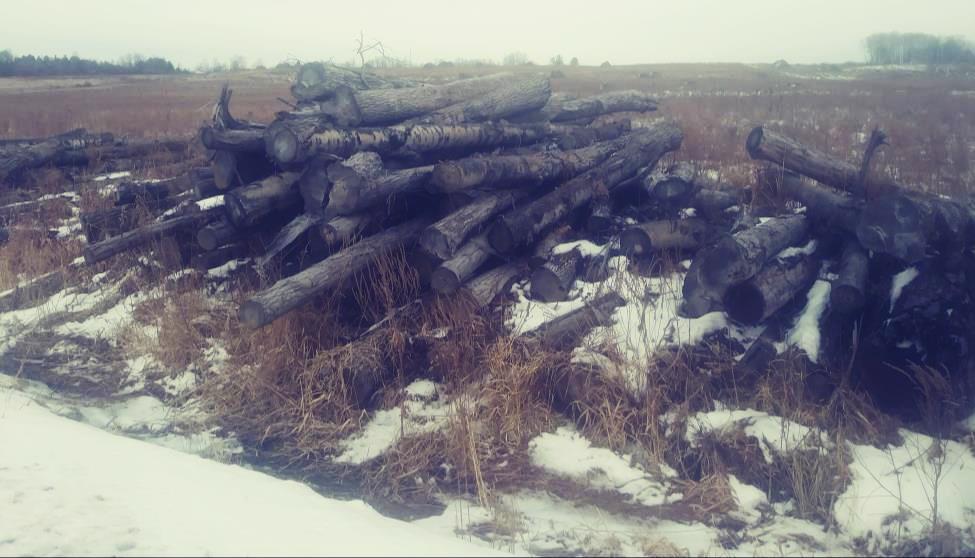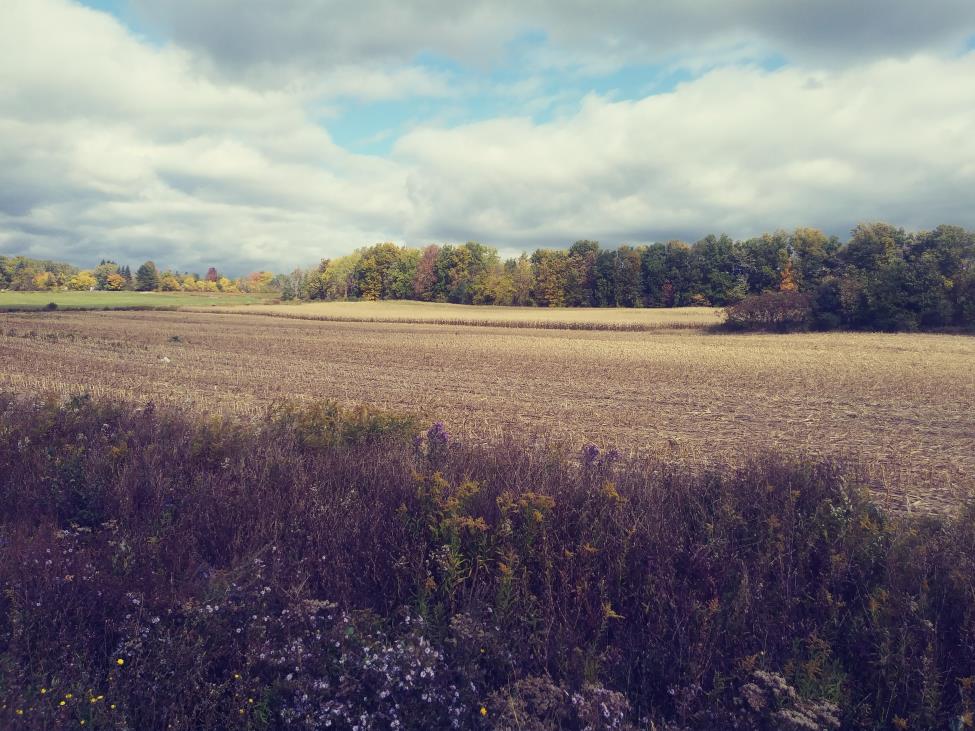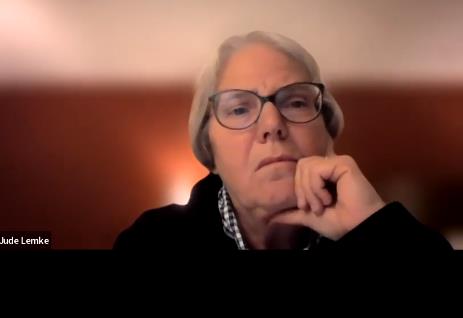Enfield Board tightens Solar Law; more changes may lie ahead

by Robert Lynch; January 3, 2023
In one pithy phrase during the Enfield Town Board’s final meeting of 2022, this Councilperson (who wrote this story) summed up public perception of solar farms in the Town of Enfield: “People don’t like what they see.”
And during that post-Christmas session, convened explicitly to adopt revisions to the Town’s 2019 Solar Law, collective concern quickly shifted away from the 16-page document that the Board voted to adopt. Instead, it pivoted toward further revision, potential changes that would limit how invasively solar panels may intrude onto agricultural land, or perhaps in the extreme, whether maybe Enfield should ban new industrial solar farms altogether.
The Town Board’s December 27th unanimous vote put an end to a year-long Enfield moratorium it had imposed to suspend the permitting of new, large-scale commercial solar installations in the town.
The Board’s earlier action was rooted in experience. In 2021, the Town Planning Board authorized Enfield’s largest proposed solar farm to date, the 15 Megawatt Norbut Solar Farm across from Johnny’s Wholesale on South Applegate Road. For the past year, however, Norbut Solar has delayed construction, developers citing supply chain problems. As the Town Board amended the law that Tuesday night, it did not state whether the adopted changes could be applied to Norbut retroactively.
Yet the Norbut shadow hung over the Board’s half-hour of deliberations prior to its vote. After Norbut had secured its Planning Board permit, the firm quickly called in a logger to strip the site of nearly all its trees. It left logs by the roadside for more than a year. Woodsmen abandoned the site with wood shavings in cone-like mounds on the hilltop. In ways, it resembled the lunar surface. And whereas the prior owner had once farmed much of the land, Norbut allowed the field to grow to weeds throughout 2022.
“I’m sorry,” Councilperson Robert Lynch told the Town Board. “That operator came to us, and he expressed good intentions. He indicated he was going to be a good neighbor. And since we gave him the permit, in my opinion, he has not been a good neighbor.”
Lynch continued, “I called last winter to say, please, remove those logs that you’ve got near the road right-of-way. They took some away. They didn’t take them all. There’re some still there. And there are piles of wood shavings up on the hill. They could have done right. They can’t get the solar panels this year. That’s a supply chain problem. But they could have at least hired somebody to come in and mow down the goldenrod, take away the logs, and make it look respectable. And they did not.”
Largely because of those concerns—and his stated perception that many in Enfield have now soured on large-scale solar—this writer, Councilperson Lynch, resubmitted a retooled proposed further amendment to the revised solar law.
Scripted in an attempt to impose pinpointed land-use regulation within un-zoned Enfield, the amendment would have sought to prevent a solar operator from wasting away the 40 per cent of a solar farm’s site that Enfield’s 2019 law demands a developer keep free from solar panels. The new amendment would have demanded that the 40 per cent “residual acreage” remain in agricultural use or be kept mowed annually as undeveloped green-space. A solar operator would need to document compliance.

After discussion that dominated most of the half-hour devoted to the Solar Law, Lynch withdrew his amendment, but only after colleagues assured him that the Board would consider his tightened controls later.
“I don’t want us to put this Solar Law on the shelf and forget about it for another two or three years,” the Councilperson said. “I want us to actively work on that because that is becoming a concern for the community about the handling of residual acreage.”
Despite the year-long moratorium’s impact in preventing new commercial operators from approaching the Planning Board for approval, the moratorium has not delayed smaller, residential solar construction.
In December 2021, the Enfield Town Board, with little controversy, imposed an initial six-month halt to accepting applications for new commercial solar farms. The Board tacked on another six months to the moratorium last June.
The Town Board acted after the Tompkins County Industrial Development Agency (TCIDA) in the summer of 2021 granted Norbut Solar Farms tax abatement, a so-called PILOT Agreement, that permitted Norbut to pay less property tax than its assessed valuation would otherwise have demanded during the PILOT’s 30-year life. At the same time, the TCIDA refused Enfield’s request to impose upon Norbut a “Host Community Agreement,” a separate provision that would have demanded Norbut also compensate the Town over and above its PILOT payments. The TCIDA divides PILOT revenues three ways, of which Enfield was told it would get about 28 percent. Many in Enfield Government thought 28 per cent was too little.
But the Solar Law revisions adopted last month by the Town Board would affirm the Town of Enfield’s right to demand from any solar operator Host Community compensation.
“As a condition to the issuance of a Solar Permit, the applicant shall enter into a Host Community Agreement that is mutually agreed upon between the applicant and the Town Board,” the Solar Law’s newly-emplaced paragraph F-B-9 clearly-states.
“The Town Board shall retain the right to enter into said agreements with the applicant so long as they remain consistent with NY State law, notwithstanding the actions of any other governmental agencies or authorities,” another section specifies. Its language restricts the TCIDA’s potential veto power.
Other deeply weed-wandering changes in the Solar Law would expand public and governmental oversight should a solar farm operator cease or deeply curtail power production, and the Town then saw fit to dismantle the site.
The revisions scripted for adoption December 27th brought little discussion. Instead, Board members looked beyond what they’d drafted; they focused on how solar farms may have degraded—or will likely degrade—the “rural character” of Enfield that the Town’s Comprehensive Plan, adopted in 2020, had sought to protect.
Supervisor Stephanie Redmond said she’d go so far as to propose an all-out ban on new commercial solar farm permits until the Town exhausts just about every other solar generating opportunity.
“I honestly think we should take it further,” Redmond said, “to actually stop these large industrial solar farms from coming to our town until we have absolutely distributed energy on every single house, on every single building and every single parking lot, brownfield, things like that, and don’t allow them to take over our farms.”
“I don’t know if you ever talked to the environmental lawyer if that’s even legal for us to consider, to stop these industrial farms from coming in here,” Redmond inquired of other Board members.
Councilperson Jude Lemke chairs the Town’s Renewable Energy Advisory Committee. The committee has for the past year crafted the Solar Law’s revised language at meetings closed both to the public and to most other Town Board members. Lemke’s worked closest with the environmental lawyer, Dan Spitzer, whom the Town Board retained in October. And based on her discussions, Lemke, herself an attorney, questioned the legality of either the amendments Lynch proposed or the more sweeping prohibition Redmond hinted she might someday seek.
“I’m not a land use lawyer by any stretch of the imagination,” Lemke qualified. “But you can regulate where things can go in the Town. You can’t, in general, prohibit activities in the Town.”
“There are times when there are health and safety issues where you can—you know maybe the fracking—where you can do that,” Lemke added, addressing Redmond’s suggested ban. “But really you can’t just say we don’t want this in our town, and you can’t build this in our town. You can say we don’t want this in this part of our town. And you can build it here, but you can’t build it there.”
And Lemke also questioned Lynch’s more tempered proposal to mandate either farming or green-space maintenance on a solar farmer’s panel-free acreage.
“We don’t have zoning,” Lemke observed. “And there’s nothing that says we can prevent people from letting their land, you know, grow over with weeds or whatever they want.”
“We don’t have a law that allows us to tell someone you can’t just let this vacant land grow wild,” Lemke continued.

“I have a hard time wrapping my arms around that,” Lynch reacted to Lemke’s reservations. To Lynch, the “solar farm” should rightly include not only the land a farmer might lease to the solar operator to develop, but also the “residual” 40 per cent that Enfield’s innovative 2019 Solar Law requires be kept undeveloped. Lynch maintained Enfield’s Planning Board should hold power to regulate use of the residual land whether it’s within the solar operator’s leased area or retained by the landlord-farmer.
“As I see it, to make that 60 percent coverage rule have any teeth in it whatsoever, you’ve got to consider both the solar area and the residual area in the permitting process,” Lynch responded. “And if the law isn’t written that way, maybe we should redraft the law to encompass that.”
Lynch drew the comparison between unregulated agricultural or residential property owners in Enfield and farmers that rent to solar companies.
“It’s not the same thing as Doug Gunning’s farm up on Harvey Hill Road, where you don’t have to tell him to mow his field because there’s no permitting process needed for a farm,” Lynch argued. “There’s no permitting process needed for Stephanie Redmond and her husband’s house, so you don’t have to tell them that they have to mow their yard every week,” he continued. “But this is different. This is a solar farm that includes 60 percent coverage maximum with solar panels and 40 per cent something else. And why can’t the Planning Board regulate that something else?”
Unlike solar laws in many other towns, Enfield’s 2019 Solar Law imposes what’s called a “lot coverage” requirement.
The Enfield law states that: “The enclosed or fenced in area of a Large-Scale Solar Energy System shall not exceed 60% of the lot on which it is installed.” However, neither before nor after its latest revision does the law explicitly define what constitutes “the lot on which it is installed.” Redefinition could prove key in implementing any tighter controls for the undeveloped acreage.
Nonetheless, in Norbut’s case, the Rochester-based developer has chosen to own its entire site; that both on which it would place its solar panels and set-aside its residual acreage. In securing Planning Board approval, Norbut hop-scotched its panels about its holding so as to skirt identified wetlands. Norbut officials have never stated specifically how they’ll use their remaining acreage. They’ve hinted at times they might use the land’s road frontage for housing, or maybe even a food scrap processing facility.
At a mid-December Public Hearing on the Solar Law’s current amendments, one Enfield resident told the Town Board she opposes residential or commercial development on the 40 per cent of land a solar farmer must set aside. The resident, who lives near one existing solar farm and also close to fields off Podunk Road that may become a future solar farm , said she’d prefer only forests or fields, not buildings, on residual land. After that hearing, Councilperson Lynch redrafted his proposal to answer that resident’s call for open space.
“I remember when people like Beth Magee and Mimi Mehaffey were talking—and Jude Lemke were talking—about these laws back in 2019,” Lynch recalled. “There was this concern; we want to make sure that we keep the rural character of Enfield consistent with our Town Comprehensive Plan. And this is what this is trying to do,” Lynch reminded the Board.
“I don’t disagree with the concern that everyone is raising,” Lemke acknowledged. “I do think maybe we need to put together some sort of committee to take a harder look at all this, and not just the Planning Board, but broader than the Planning Board.”
“But I don’t think this language works,” Lemke spoke to the amendment Lynch had advanced.
Lemke’s broader observation could, of course, expand the scope of land use regulation far beyond only solar farms. It could lead to Enfield’s adopting its first zoning law. Both Supervisor Redmond and Lemke have talked of increased land use control in recent months. Yet no one on the Town Board has come out in favor of zoning, a highly-volatile topic in Enfield.
“I think we should adopt this as it is and keep working,” Redmond said of the solar revisions the Board had on its late-December table. She rejected Lynch’s short-lived proposal that the Board extend the moratorium still further to allow members to attack the broader issues. Yet the Supervisor added, “I really do want to think how we can have land use management policies that are reflected in our Comprehensive Plan.”
So, the Solar Law stands amended. The year-long moratorium is over. But expect more discussion—and possible further amendments—in the months to come.
“We’re going to continue to work on this idea for the residual acreage and how we can manage it so that we don’t have more wasteland in this town,” Lynch promised, as he readied to cast his affirmative vote on the revised Solar Law. “Townspeople, we hear ‘ya.”
###

